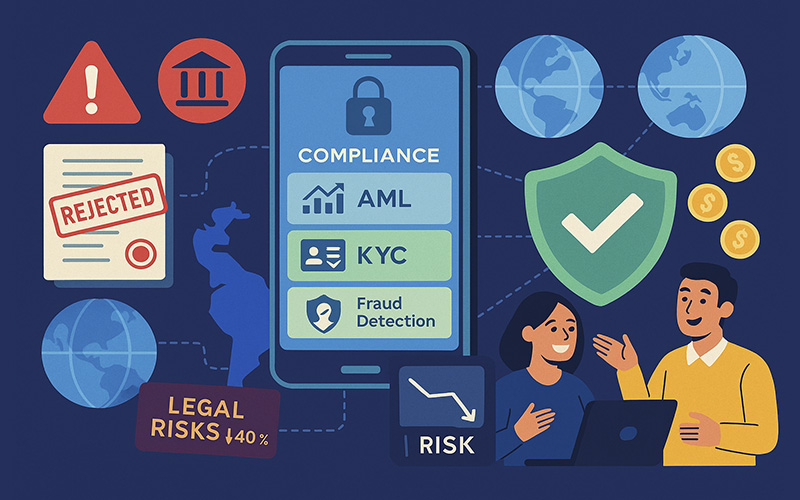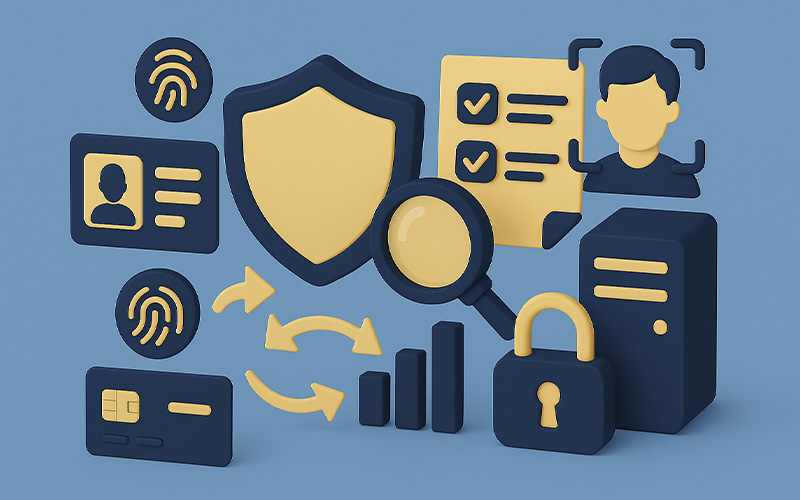Cybersecurity in Gaming: Threats, Cases, and Protection Methods
About Digital Security

It is a set of measures and technologies aimed at protecting online gambling portals from breaches, leakages, fraud, and other threats.
In the casino niche, this tool is essential for many reasons:
- Value of information. Operators process an enormous volume of personal data.
- Security of financial details. Entertainment sites perform cross-border transactions (deposits, withdrawals), which attract the attention of fraudsters.
- Implementation of AML/FATF procedures. Bets and winnings can be used for money laundering and funding criminal schemes.
- Reputational risks. The image of an iGaming company depends on security. One major leak or data breach will forever undermine trust in the casino brand.
The Infosecurity Magazine online publication quotes the following statistics:
- by the end of 2024, 47% of European operators lost 10% of their revenue due to fraud;
- €5 billion — annual losses for iGaming firms in the EU because of cybersecurity gaps;
- deepfake and AI-powered document creation are the most common methods of intervention in the work of entertainment resources.
76% of respondents stated that fraud occurs after customer registration. Most entrepreneurs identified mass manipulation of personal data (65%), money laundering (65%), and bonus abuse (64%) as the most significant problems for their business.
Top Cyber Threats for Online Casino Owners
Gambling and betting platforms are a real magnet for cybercriminals. Delinquents wish to make illegal profits, steal confidential information, or simply disrupt a website's operation, especially if it involves multi-million dollar transactions and turnover.
Port Scan Attacks
Before hacking the virtual portal, offenders often initiate Port Scanning. They check which services are running on the operator's servers to find weak points and penetrate the system.
The goal of such actions is to find vulnerabilities in the iGaming resource. These include old software versions, unprotected APIs, exposed databases, etc.
Such scanning alone does not always cause harm to entrepreneurs. Most often, it is the first stage of a larger attack, which can begin within days or hours.
To protect themselves, casino owners should use:
- firewalls;
- IDS/IPS (intrusion detection and prevention) systems;
- real-time network activity monitoring.
Ransomware
These are malicious programs that encrypt data on a server and demand a ransom to restore it.
For iGaming companies, such an attack can be catastrophic: the website stops functioning, internal databases and payment systems are blocked, and the delinquents demand hundreds of thousands of dollars for returning access to the information.
In 2023, several major European operators experienced big data breaches. Hackers exploited the vulnerability in an outdated API to infiltrate internal CRM systems and financial gateways.
The main consequences of the attacks include:
- loss of access to client databases and transaction history;
- leakage of confidential information to the darknet, including the deposits of players;
- suspension of payouts and all financial transactions.
The size of the ransom in this case typically varies from $200,000 to $1 million. The amount depends on the volume of stolen details and the scale of the brand.
To minimise the risk of infection, it is necessary to:
- regularly back up databases;
- timely update the software;
- isolate crucial infrastructure nodes;
- limit API access to trusted services only.
DDoS Attacks
Distributed Denial of Service is a massive cyber interference in which a website or server faces a huge amount of traffic. The system is unable to handle the peak load and immediately crashes.
The goal of such an intrusion is to completely block the online casino. Gamblers are unable to access the platform, bets are not processed through payment gateways, and entrepreneurs lose huge amounts of money.
Many attackers use DDoS as an instrument of blackmail. To stop the massive attack, business owners must pay a ransom.
Effective protection methods include:
- anti-DDoS filters;
- cDN services (for example, Cloudflare and Akamai);
- geographical distribution of servers;
- load balancing.
SQL Injections and XSS
These 2 threats are often underestimated, yet they form the basis for the most data breaches in gambling:
- SQL Injection. This type of attack involves inserting malicious code directly into a website, for example, into a “login” or “search” field. If the system does not filter the inputs, the criminal will gain access to the database.
- XSS (Cross-Site Scripting). In this case, a malicious script is injected into a digital page and is launched on the user's end. This allows an attacker to steal cookies, sessions, passwords, or substitute the interface.
To protect iGaming portals, it is important to validate all inputs promptly. It is also possible to filter HTML tags or update frameworks and content management systems.
Brute Force
This is a method of selecting a password in which a fraudster or bot automatically tries thousands of login and access combinations until a working one is found.
In the gambling industry, such hacks most often target admin panels, user accounts, and platform API keys. If the password is not strong enough (for example, admin123), the system is compromised in seconds.
To protect themselves against brute force attacks, entrepreneurs can:
- activate multi-factor authentication (MFA);
- limit login attempts;
- add a captcha and a failed login tracking system.
Phishing
This is one of the oldest, yet still effective, tools of cyber fraud. Criminals send e-mails that visually resemble official notifications from casinos, banks, or regulators to gain access to confidential information such as usernames, passwords, and wallets.
In the iGaming industry, phishing often targets not only customers but also employees: accountants, administrators, and support staff. One careless action can open the way to a company's internal network.
To minimise risks, it is important to:
- regularly teach employees the cybersecurity rules;
- use anti-spam filters and two-factor authentication;
- periodically check corporate domains and sender addresses.
Real-Life Cases of Casino Hacks
Let us look at the cyberthreats operators have faced in recent years.
MGM Resorts International
In September 2023, the largest American provider suffered from a large-scale phishing.
A group of hackers penetrated the company's internal system through social engineering. According to some sources, the criminals contacted the support service of one of the casino complexes and tricked an employee into resetting the password.
As a result of the attack, booking systems and the work of slot machines in the halls were interrupted. Electronic room keys were also blocked, and the losses were estimated at $100 million.
Caesars Entertainment
This is another cyberattack in the US related to a personal data leak. This time, the affected provider was Caesars Entertainment, which owns a network of land-based casinos and digital platforms in many states. According to some sources, the brand paid approximately $15 million to prevent the publication of stolen confidential information.
Strendus
In 2023, one of the websites of the Mexican gambling firm provided open access to authentication logs. This contained 85GB of personal data, including names, addresses, and ID cards of clients.
This careless behaviour resulted in a large-scale leak, reputational damage, and lawsuits from the injured parties.
Merkur
In early 2025, a security breach resulted in the disclosure of the confidential information of over 800,000 players on the company’s platforms in Germany.
The attackers obtained:
- names, addresses, and other personal details;
- the history of bets and transactions;
- data on the devices used to access accounts;
- copies of passports and ID cards.
Mill Adventure, a key security partner of Merkur, stated that the vulnerability had been patched by March 17. Nevertheless, the incident raised concerns among both the affected players and the German regulator, the Gemeinsame Glücksspielbehörde der Länder (GGL).
How to Protect a Gambling Project from Cyberthreats
Gaminator Casino experts have prepared several useful tips.
Building a Security System from Scratch
Protection tools should be built into the architecture of an entertainment startup from the very beginning.
Engineers can use:
- modern transmission protocols (HTTPS, TLS 1.3);
- separate storage of information about customers and games;
- server isolation (front-end, database, and payments).
Authentication and Access Control
Each employee, partner, or client should work only with the materials they truly need. This approach reduces the risk of phishing, large-scale leakages, as well as the burden on the support team and internal departments.
Recommended measures include:
- multi-factor authentication for all administrative panels;
- review and update of user rights;
- restriction of the IP access.
Regularly Upgrade and Testing of the System
Hackers most often find loopholes due to old vulnerabilities in gambling platforms. For this reason, it is important to:
- keep the CMS, plug-ins, API, and libraries relevant;
- conduct periodic scanning for potential weak points;
- check server and firewall settings.
Team Training
The human factor remains the main cause of massive breaches. Even the most expensive intrusion prevention system often fails to protect iGaming portals from hacking if an administrator or support staff accidentally opens a phishing e-mail.
Operators should conduct regular cybersecurity training, teaching not only technical specialists but also professionals who work in the accounting, management, and marketing departments. Phishing attacks can be simulated and reactions of employees are assessed in real-time.
Protecting User Data
To prevent large-scale breaches, it is necessary to perform the following actions:
- encode the information on players at rest and in transit (end-to-end encryption);
- store KYC documents (passports, account numbers) on isolated servers;
- restrict access to databases;
- use tokenisation — store encrypted digital coins instead of actual cards.
The Application of Professional Solutions
At Gaminator Casino, you can order high-quality software from Afimac, Yoti, Alfa Protection, Arxan, Feature Space, and other providers. These products are equipped with firewalls, CDN systems for redistribution of loads, SIEM modules for log analysis, and other useful tools.
Constant Audit
It is important to regularly conduct external inspections and certifications:
- PCI DSS (if operators accept Visa/Mastercard cards);
- ISO 27001 (information security standard);
- GDPR compliance, etc.
The Main Things about Digital Security in Gambling

The goal of such attacks is to obtain confidential information and financial resources or exploit vulnerabilities to abuse bonus mechanisms and commit money laundering. To minimise risks, it is important for entrepreneurs to develop a comprehensive security strategy.
It should include both technical and organisational measures, such as:
- timely updates of the database and program components;
- creating backups of critical modules and components;
- access rights control and multi-level authentication;
- regular external audits and vulnerability testing;
- use of specialised security software.
You can order branded gambling products from Gaminator Casino. Our innovative proprietary system supports land-based establishments, desktop websites, and mobile apps. We also offer flexible settings and licensed content.
Check the information used to contact us carefully. It is necessary for your safety.
Fraudsters can use contacts that look like ours to scam customers. Therefore, we ask you to enter only the addresses that are indicated on our official website.
Be careful! Our team is not responsible for the activities of persons using similar contact details.



